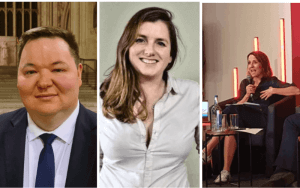There is a clear gap between the “words and actions” of the voluntary sector when it comes to including and recognising disabled people as employees and leaders, according to new research.
The research found that disabled people in senior positions across the sector often felt the need to hide their impairments if they wanted to be accepted as leaders.
And it found that disabled leaders were often frustrated at being “pigeonholed in disability-related roles and organisations”, and at not having the same career options within the sector as non-disabled people.
The low profile of disabled employees across civil society is low, but it is “even lower for disabled leaders in the sector”, says the research.
The two reports were commissioned by the Association of Chief Executives of Voluntary Organisations (ACEVO), and were co-authored by disabled activist Zara Todd (pictured) – former chair of Inclusion London – and researcher Ellie Munro.
ACEVO had commissioned the two reports – Hidden Leaders and Accessing Leadership – in recognition that it should do more to help create a more disability-inclusive civil society sector.
ACEVO’s own data from 2019 showed that none of its 15 staff or 11 trustees identified as disabled people.
As part of the research, Todd carried out 10 in-depth interviews, with “numerous interviewees [speaking] of disability inclusion within civil society as aspired to but rarely delivered”.
One disabled leader told her: “You end up being typecast as to where you are and where you should be as a disabled CEO.
“At the start of my career I looked outside the disability space for work but didn’t get anywhere.
“As a disabled leader you are not seen as a whole person.”
Another told her: “I have powered through inaccessibility to make it seem like there’s no problem, masking and accommodating inaccessibility to the detriment of my own well-being.”
Todd and Munro said they struggled to find any disabled leaders in civil society who were not associated with work on disability.
They said: “The consequences of disclosure in the sector as it currently stands leave many disabled leaders feeling pigeonholed or trapped in working for organisations related to their identity.
“A number of our interviewees identified not being taken seriously outside of the disability space and not having their skills as leaders valued or recognised.”
They also found that disabled leaders are “rarely asked to talk about innovation, people management or managing governance structures” but instead they are asked to focus on “storytelling and talking about the barriers and solutions to the sector’s and society’s issues around diversity”.
The research also found that, of the 25 largest charities (by annual income), 10 of them did not mention disabled staff at all in their annual reports.
Of those 10, nine were members of the government’s much-criticised Disability Confident scheme, which is supposed to encourage employers to “think differently about disability and take action to improve how they recruit, retain and develop disabled people”.
Among the recommendations in Hidden Leaders are for charities to ensure they have “clear information available for staff around reasonable adjustments and the Access to Work programme”, and for larger organisations to collect disability data about their staff.
It also calls for charities to make it clear that they follow the social or human rights models of disability; to conduct reviews to ensure that all their policies and procedures are “anti-oppressive, non-exploitative and supportive of disabled people”; and to run events aimed at disabled people with additional protected characteristics, such as disabled people of colour or disabled women.
Among their recommendations for ACEVO, Todd and Munro say the organisation should create a network for grassroots leaders from marginalised backgrounds; and provide templates so member organisations can develop their own access and inclusion manifestos, and capture disability workforce data.
They also say ACEVO should co-produce materials with user-led organisations to help the sector and society “understand the difference between user-led organisations and ‘organisations for’ disabled people”.
Todd told Disability News Service: “One of the things that surprised me the most during the evidence gathering was how little the wider sector knows about the disability movement.
“Hopefully, by ACEVO championing the inclusion of disabled leaders, their talent and hard work will get the wider acknowledgement it deserves.”
A note from the editor:
Please consider making a voluntary financial contribution to support the work of DNS and allow it to continue producing independent, carefully-researched news stories that focus on the lives and rights of disabled people and their user-led organisations.
Please do not contribute if you cannot afford to do so, and please note that DNS is not a charity. It is run and owned by disabled journalist John Pring and has been from its launch in April 2009.
Thank you for anything you can do to support the work of DNS…

 Shock of activists as disability minister ignores disabled woman who collapsed on floor after cuts meeting
Shock of activists as disability minister ignores disabled woman who collapsed on floor after cuts meeting Most employers have had zero contact with DWP, report shows, in blow to green paper plans
Most employers have had zero contact with DWP, report shows, in blow to green paper plans DWP ministers fail to sign up to their own disability employment scheme, seven months after election
DWP ministers fail to sign up to their own disability employment scheme, seven months after election